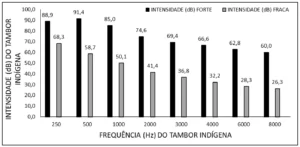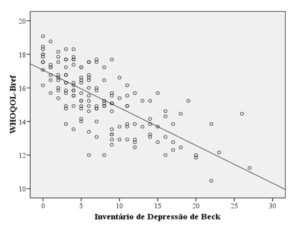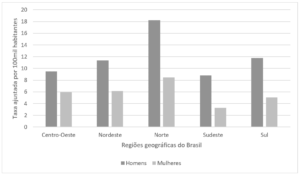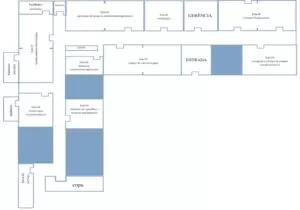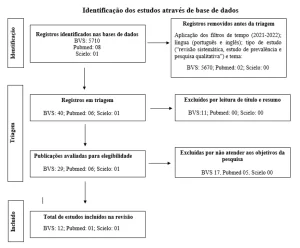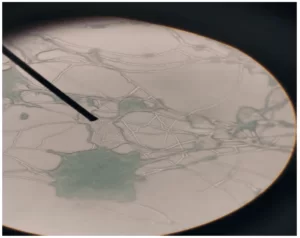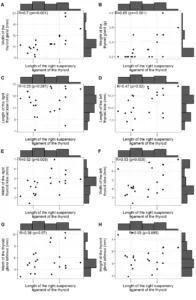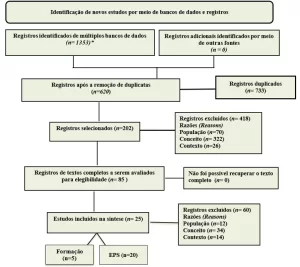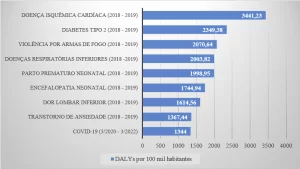CARLOS NETO, Daniel [1]
CARLOS NETO, Daniel; Impact of Judicialization on public health. Multidisciplinary Core scientific journal of knowledge – Multidisciplinary scientific journal Knowledge core-vol. 1. Year. 1. March. 2016, pp: 15-20-ISSN: 0959-2448
SUMMARY
Judicialization of health refers to the pursuit of the judiciary as the last alternative for obtaining the medicine or treatment now denied by SUS or by lack of foresight on RENAME (National Relationship of Medicines), whether for budgetary issues. On the basis of the above the goal of this article is to check the impact of judicialization of health in public administration. The methodology adopted was the doctrinal research with survey data in the literature. From the study of literature, it is concluded that judicialization of health in public administration budget and financial instability and cause some distortions in public planning which, the magistrates have ignored when in decision-making.
Keywords: Judicialization. Health. Medicine. Treatment. Public management.
INTRODUCTION
This article has as its theme the judicialization of health impacts in public administration, particularly with regard to the public and financial budget.
In this perspective, issues built that guided this work:
Why impact occurs in the public administration regarding the judicialization of health?
The public administration is an organic part of the structure that makes up the Executive branch of the Union, the States and municipalities that relates, in the course of their duties, with the legislative and Judicial Powers.
In the case of the judiciary, this was created as a neutral power politically, because of the principle of legality there to apply the law, making the laws drawn up are made essentially by the Legislature. However, over the years were occurring changes in the functions of courts to be adapted to the context of each season (oak, 2004).
It was from the promulgation of the Constitution of the Federative Republic of Brazil of 1988 (CRFB) that were enshrined social rights such as the right to health, education and housing. In this way, these guarantees have become positivado law, opening a new sphere for judicial performance.
The judges, in addition to acting in order to protect the rights of citizens, also have a duty to give the constitutional supremacy. Thus, it was granted to them, does not resolve attribute only disputes between the parties, but to annul acts of State. But, in practice, actually occurs the interference by the courts in public policy, as well as the diversion of public resources, including medication for people who seek the implementation of their constitutional rights and the impact on public finances for damage (SANTOS, 2010).
According to Rodriguez (2004), the work of the magistrates should be focusing on ensuring the citizenship and the achievement of fundamental rights, but there are issues which end up contrary to this role of the Judiciary, such as the judicialization of politics, for example.
On the basis of the above, a problem which is what the impact of Judicialization of health in public administration and the consequences for the population.
Considering the context presented, the objective of this article is to check the impact of judicialization of health in public administration.
The research methodology adopted was the review of the literature on the subject, consisting of electronic items, periodicals, books, magazines and other material that verse on the topic.
PUBLIC HEALTH MANAGEMENT X
The public administration is defined by Banerjee and Zouain (2010) as the fundamental substance of the activity corresponding to the Executive power, which refers to the exercise of Management played by its holder on the property of the State. It is a way to manage immediate and permanent mode to meet the public needs in the search for the good of all. Such assignment is actually performing a public service, subjected to the legal limit in particular that Norma and becomes effective from the date of issue and sale of administrative acts.
For the authors, public management the way an institution or public managers have to structure and organize the assets of a State. It is a political power in which the individual receives the authority to manage the business and activities of a distribution or public company in order to make these work as expected. In addition to the foregoing, Banerjee and Zouain (2010) still highlight that public management is to manage a public good that delivered the ruling political parties, and duty, to manage properly and fairly and disciplined such goods.
According to Lee (2010), in public administration there are a diversity of tasks that are established as determination of laws, giving competence to those that are an integral part of the public of a state machine. Therefore, these are required to pay bills through public reports to be evaluated by the Parliament and society at large.
To Di Pietro (2007), public management it is important to consider the fact that this is a machine of the people, the public good, because, in addition to administering and organizing, is also a public thing that allows the Organization of something public, definitely.
According to the author, in the Constitution of the Federative Republic of Brazil of 1988, title III, Chapter VII, is set out in the provisions on the Public Administration and in the main section of the CF/88, has based the basic principles that need to be respected. These principles are the legality, impersonality, morality, publicness and efficiency, among others of equal importance specified in article 37. In article 38 the elective mandate structures of public servers.
In addition to the foregoing, Di Pietro (2007) points out that along with the organizational structure of the public administration also act private ones that assist the State in the activities of public interest. Among such loved the social organizations, social services and autonomous civil society organizations of collective interest.
However, Barroso (2007) points out that if you have observed judicialization in public administration. This is an action that occurs in public policy all the times in which the courts in exercising their normal functions, directly affect the conditions of political action and can impact on public administration.
Second Bliacheriene and Santos (2010), with regard to the impacts on public management, there is the possibility to directly affect the political system as to the impact on democracy and freedom of the citizens. Such impacts of judicialization on public administration affect mainly the public budget and financial sectors of public policy.
In the case of the impact on the public budget refers to the economic criterion as to the impact on the public purse resulting from the decision, as well as the social impact by affecting all the collective due to the diversion of resources and public funds and also impacts the principles of public policy because it is a set of actions directed to all citizens.
According to Vianna (1999), taking into consideration the growth of spending on the judgments and expenditure with medicine of the unified health system (SUS), there is a tendency of the State have bigger expenses for the supply of medicines as a result of judgments the individual situations compared to the supply of drugs distributed to the collective. This fact demonstrates the strong influence that judicialization has on health with evident impact on the public budget.
In this way, it should be noted that the lawsuit WINS controversial considerations relating to his interference in the Executive’s budget, because it involves decision making techniques that the judiciary establishes to the alternative treatment and remedies which must be provided by the Government, without the need to stop the specific knowledge.
On the basis of the above, one can see that the magistrates have not given so much importance to the budgetary principles and the impacts caused by their decisions. In addition, it is noteworthy that when there are consideration as to the foundations, there is a tendency not to grant the action, dismissed.
For Bliacheriene and Santos (2010), about the financial impact of judicialization on health, occurs in cases where the Judiciary’s decisions which may interfere directly in the activities already planned by the Government and that need to be made through public policies.
This is because, according to CRFB (1988), art. 196, it is foreseen that health is a right of all and duty of the State. Means, on the basis set out in art. 196, the State acts as a way to implement this right through the SUS so integral and universal. However, the right to health and other rights, was created for its implementation in the future.
However, Vianna (1999) explain that if you have noticed that the SUS has yet to implement concretely the principle of integral care as established by the CRFB (1988), whereas the limitation that its resources have. In this way, people who are users of SUS end up having to resort to the Judiciary to ensure access to some medicines.
In this context, Barroso (2007) points out:
Common integral care programmes are, by virtue of which, in addition to medicines, patients receive medical, psychological and social. When there is any court decision determining the immediate delivery of medicines, often the Government withdraws the drug program, desatendendo to a patient that received regularly, to deliver it to the individual litigant who obtained a favorable decision. Such decisions will deprive the administration of the ability to plan, compromising the administrative efficiency in serving the citizen. Each of the decisions can meet the immediate needs of the jurisdicionado, but, overall, would prevent the optimization of State possibilities as regards the promotion of public health (BARROSO, 2007, p. 154).
On the basis of the above, note that the impacts caused by the judicialization of health in public management generate budget instability, causing deformities between the distribution of the resources with which in fact had been planned, in addition, still, distortions caused directly in the administration of public policy. Considering this point of view, we can say that judicialization if shows negative.
For Carvalho (2004), you can’t deny the right of users of SUS in resorting to the Judiciary to achieve their rights guaranteed, because this has the ability to bring pressure to bear to show the public that there is a demand that is not being met and, by means of Justice, it is possible to obtain a public policy to meet all the demand.
In addition, note that judicialization has a individualizador character and thus puts on the collective, the individual right.
FINAL CONSIDERATIONS
In order to check the impact of judicialization of health in public management, it was noted that the CRFB enshrined the Judiciary as their protector, contributing to its strengthening as a mechanism of protection of all fundamental rights, as well as the control of the actions of the Executive and legislative branches.
Still, it doesn’t seem to separate the democratic judicial control of the situations regarding public policies, Yes, based on the principle of access to justice, it is not the duty of the legislative, Executive or Judicial Power, determine issues to be considered exempt from judicial control to make the right of action.
Only considering each case put on trial it will be possible to determine, ultimately, the judicialidade of each situation. In fact, you need to know to recognize that, as a fundamental right, the right to health is not absolute and therefore is subject to restrictions as to its implementation by the judiciary.
It is in these boundaries lies the greatest challenge, is to ensure the right to health, should the judiciary into public policies, well established by the Executive without enabling the individual fundamental right, overlap of a whole collective and go beyond the CRFB itself.
Therefore, the impacts caused by the judicialization of health in public management are directly in the public and financial budget, because there is large and continuous increase of lawsuits to provide individual demand, the State remedies.
REFERENCES
BARROSO, Luis Roberto. The lack of effectiveness to excessive judicialization: right to health, free supply of medicines and parameters for the action. RPGR magazine, Porto Alegre, v. 31, no. 66, pp. 89-114, July/Dec, 2007.
BLIACHERIENE, Ana Carla; SANTOS, José Sebastião dos. Right to life and health: budget and legal impacts. São Paulo: Atlas, 2010.
Oak, Ernani Rastogi. In search of the judicialization of politics in
Brazil: Notes for a new approach. Political sociology magazine, Curitiba, 23, p. 115-126, nov. 2004.
LEE, Mauricio Caldas. Judicialization of health. Rio de Janeiro: Lumen Juris, 2010.
RODRIGUEZ, Eduardo Andres Ferreira. Legal debts in the public budget: some considerations. Legislative Information magazine, Brasília, v. 41, n. 163, p. 391 to 402,/set.. 2004.
SANTOS, José Sebastião dos. Right to life and health: budget and legal impacts. São Paulo: Atlas, 2010.
VIANNA, Luiz Werneck. Judicialization of politics and social relations in Brazil. Rio de Janeiro: Revan, 1999
[1] Lawyer. Of academic medicine. PhD in public health. Executive Mba. Specialized in Applied health services. Graduation in family health. Audit specialist. Email: [email protected]

